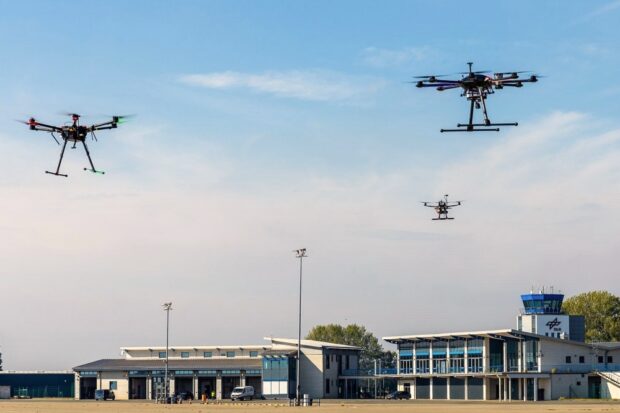With a view to testing the use of drones in offshore wind farms, the German Aerospace Center (Deutsches Zentrum für Luft- und Raumfahrt; DLR) will be using a geo-zone at the National Experimental Center for Unmanned Aircraft Systems in June 2024 to expand drone operations in the open category.
The establishment of this special geographical area makes it possible to fly drones with a take-off mass of up to 800 kilograms outside the direct field of vision at Cochstedt Airport.
Whether for photography or film footage, transporting goods to remote areas such as offshore wind farms, or monitoring the condition of buildings and agricultural land, drones are being used in an increasingly diverse range of applications. However, there are special restrictions for drones in certain areas, such as airports and their immediate surroundings. Known as geo-zones or geographical UAS (Uncrewed Aerial System) areas, these are portions of airspace where drone operations are facilitated, restricted or excluded. The German Federal Ministry for Digital and Transport (Bundesministerium für Digitales und Verkehr; BMDV) determines geo-zones on the basis of the section 21h of the German Rules of the Air Regulations.
At DLR’s National Experimental Test Center for Unmanned Aircraft Systems at Cochstedt Airport, a geo-zone for the operation of drones in the ‘extended open category’ will be set up for the first time in June 2024, allowing the aircraft to operate without special authorisation within certain boundaries. The DLR Institute of Flight Systems has worked with the German Federal Aviation Office (Luftfahrtbundesamt; LBA) to develop the necessary framework and submit the application to the BMDV for this geo-zone.
“As users of the geo-zone, drone operators must adhere to these requirements in order to guarantee the highest safety standards for experimental operations,”
explains Sebastian Cain from the Institute of Flight Systems. Some of the safety requirements, such as airspace monitoring, are already ensured by the established procedures of the National Test Center. Other measures, such as the technical operation of drones by qualified personnel and compliance with strict rules for the flight missions, must be ensured by the drone operator.
Low-Risk Drone Flights at Magdeburg-Cochstedt Airport
The operational framework that has been drawn up is the result of a generalised safety analysis, which in turn is based on the specifications of the SORA (Specific Operational Risk Assessment) procedure, a recognised methodology for the classification of the risk posed by a drone flight in the specific category of operations. The safety analysis showed that drone operations pose a low risk to uninvolved parties, and the specially defined rules for the open geo-zone also enable not only the testing of drones with a maximum take-off mass of 800 kilograms, but also BVLOS (Beyond Visual Line of Sight) flights.
“We are creating an unprecedented framework for the testing of drones. Without compromising on safety, we offer a sandbox for the drone industry that enables new developments without requiring the complex procedures that may be required for authorisations in other European countries,”
says Johann Dauer, Head of the Unmanned Aircraft Department at the DLR Institute of Flight Systems.
Geo-Zone Launching in June 2024
The newly established geo-zone will initially be temporarily active in June 2024 and will play a key role in enabling test flights for the Offshore Drone Challenge. This is the first implementation of a geo-zone that enables drone operations in an extended open category in Germany, a major breakthrough for the testing of UASs in the context of harmonised European drone legislation.
DLR is currently working on the operating conditions for a possible permanent open geo-zone at Cochstedt Airport to make it easier to test UASs in the future. This will enable both DLR researchers and external drone operators to undertake rapid testing and further development of UASs in real-world conditions at the National Experimental Test Center for Unmanned Aircraft Systems.
Testing Flight Manoeuvres at the Offshore Drone Challenge in Cochstedt
On 19 and 20 June, DLR and the energy supplier EnBW are organising the Offshore Drone Challenge at the National Experimental Test Center for Unmanned Aircraft Systems in Cochstedt. The focus of this competition is the demonstration of a freight transport mission that is relevant in the operation and maintenance logistics for offshore wind farms. During the two-day event, seven drone manufacturers and service providers will be demonstrating their technologies and undergoing various tasks such as picking up and setting down a load with as little manual intervention as possible, or flying out of visual line of sight. The flight demonstrations will be a first step in demonstrating drones’ capabilities in offshore goods transportation.
Source: Press Release



